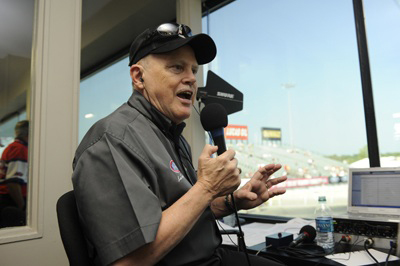 At The Finish Line -
Leo Joseph Taugher II
At The Finish Line -
Leo Joseph Taugher II
July 4, 1945 - February 2, 2015
When Leo Taugher passed away after a brutal struggle against cancer, every aspect of drag racing lost a precious commodity. While his last name always brought about mispronunciations and misspellings, (it’s actually pronounced “TAW-her”), he was known simply as “Leo” to the thousands who considered him a friend and the equal number who depended on him to perform his job better than the vast majority of those given the same task.
It was at Dick Mossey’s Quaker City Dragway in Salem, Ohio, that Leo was first given the chance to deliver drag racing information to a paying crowd, and his natural talent of disseminating facts about a sport he loved led to other announcing jobs at other tracks. Eventually, he was “discovered” by NHRA Division III Director Bob Daniels who installed Leo as the voice of the Division’s National Opens and World Championship Series events.
In 1978, Leo brought his impeccable product to the NHRA U.S. Nationals in Indianapolis and he immediately earned a place within one of the most-loved drag racing announcing teams by working with Dave McClelland and Steve Evans at NHRA national events across the country. Leo Taugher can easily be considered one of the sport’s great announcers. However, Leo stood alone for what MADE Leo great.
Through five different decades, Leo earned the trust of virtually every racer with whom he worked; he was notorious for spending hours in the pit area gathering personal and professional information for use in his presentation. His genuine enthusiasm for the sport was evident in the smile he presented to every person he met. Moreover, he possessed possibly the best trait of any researcher. He knew how to LISTEN and he knew exactly for WHAT to listen.
Leo realized announcing was not simply a matter of presenting facts. He performed his job for more than a decade before the introduction of scoreboards to the majority of tracks, and it was during this period in which he learned the power of the announcer holding the most important of all bits of knowledge, the elapsed times and speeds. He also honed his skills almost two decades prior to the appearance of computer screens that offered all but a teleprompter to those who quickly became “readers” rather than “announcers”.
Leo Taugher understood an announcer’s position as teacher, entertainer, huckster and, most important of all, salesman. He knew the hours required in study away from the track to keep abreast of any changes in rules or format. Most of all, he knew how to deliver in any of those positions in equally impressive fashion. Leo Taugher could do it all.
Announcing was not Leo’s primary vocation. Immediately after graduating from college with a Bachelor’s Degree in Business, he was drafted into the Marines and served a stint in Vietnam from 1969 through 1971. Upon his return to Ohio, Leo took a position with Columbiana County as Deputy Director of Job Training, which he held for nearly forty years before retiring in 2005.
Yet the effort he expended on his drag racing announcing duties was no less than what was put forth by those who performed the job full time. In fact, Leo took on what many consider to be the toughest call for any drag racing enthusiast; early in his career, he decided to concentrate on the sportsman ranks as his point of preference and few, if any, NHRA announcers were ever better at presenting the sportsman categories in a clear, concise, informative and entertaining manner.
Racers often groaned if Leo was not “on duty” at the time their class was running. Although he was just as good with professional category drivers and machines (he announced with several organizations including the Super Chevy Show tour when it was the second largest series in the sport), Leo masterfully explained the differences in the classes and why they mattered to the listener. Even the media was dependent on Leo to deliver the important statistics that other members of the team seemed incapable of divulging.
Leo could skillfully weave the names of family members and recent happenings in a racer’s life into the tapestry of driver versus vehicle versus race outcome in his delivery. In recent years when he would start his shift, Taugher’s cell phone would virtually explode in the timing tower from people thanking him for coming on the air. He was THAT good.
When he was forced to limit his schedule when he began his fight with cancer, it became apparent to those who loved Leo that the sport would never be the same when he would be gone. In his absence, it became glaringly apparent just how much he would be missed. Although the end was not a surprise to many, it only amplified the finality of the loss.
There were not many people like Leo Taugher. More importantly, there may never be anyone else like Leo Taugher. His devotion to his friends, his technique, and his sport may never be matched. ![]()


